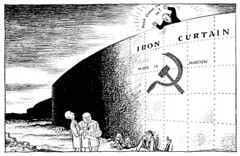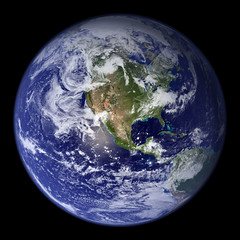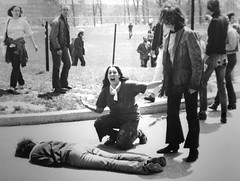AP US History Period 8 (1945-1980) Flashcards
Terms : Hide Images [1]
| 6569503622 | Lend Lease | Legislation proposed by FDR and adopted by congress, stating that the U.S could either sell or lease arms and other equipment to any country whose security was vital to America's interest -> military equipment to help Britain war effort was shipped from U.S |  | 0 |
| 6569503623 | Cash and Carry Policy | 1939. Law passed by Congress which allowed a nation at war to purchase goods and arms in US as long as they paid cash and carried merchandise on their own ships. This benefited the Allies, because Britain was dominant naval power. |  | 1 |
| 6569503624 | Neutrality Act | 4 laws passed in the late 1930s that were designed to keep the US out of international incidents. Originally designed to avoid American involvement in World War II by preventing loans to those countries taking part in the conflict; they were later modified in 1939 to allow aid to Great Britain and other Allied nations. |  | 2 |
| 6569503625 | Pearl Harbor | 7:50-10:00 AM, December 7, 1941 - Surprise attack by the Japanese on the main U.S. Pacific Fleet harbored in Pearl Harbor, Hawaii destroyed 18 U.S. ships and 200 aircraft. American losses were 3000, Japanese losses less than 100. In response, the U.S. declared war on Japan and Germany, entering World War II. |  | 3 |
| 6569503626 | Midway | 1942, An important battle in the Asian part of the war, the Americans sank 4 Japanese aircraft carriers |  | 4 |
| 6569503627 | Mobilization | Act of assembling and putting into readiness for war or other emergency: "mobilization of the troops" |  | 5 |
| 6569503628 | Victory Gardens | Backyard gardens; Americans were encouraged to grow their own vegetables to support the war effort |  | 6 |
| 6569503629 | Rationing | A system of allocating scarce goods and services using criteria other than price |  | 7 |
| 6569503630 | D-Day | (FDR) , June 6, 1944, 160,000 Allied troops landed along a 50-mile stretch of heavily-fortified French coastline to fight Nazi Germany on the beaches of Normandy, France. General Dwight D. Eisenhower called the operation a crusade in which "we will accept nothing less than full victory." More than 5,000 Ships and 13,000 aircraft supported the D-Day invasion, and by day's end on June 6, the Allies gained a foot- hold in Normandy. |  | 8 |
| 6569503631 | Battle of the Bulge | December, 1944-January, 1945 - After recapturing France, the Allied advance became stalled along the German border. In the winter of 1944, Germany staged a massive counterattack in Belgium and Luxembourg which pushed a 30 mile "bulge" into the Allied lines. The Allies stopped the German advance and threw them back across the Rhine with heavy losses. |  | 9 |
| 6569503632 | Manhattan Project | Code name for the U.S. effort during World War II to produce the atomic bomb. Much of the early research was done in New York City by refugee physicists in the United States. |  | 10 |
| 6569503633 | Hiroshima | City in Japan, the first to be destroyed by an atomic bomb, on August 6, 1945. The bombing hastened the end of World War II. |  | 11 |
| 6569503634 | Island Hopping | A military strategy used during World War II that involved selectively attacking specific enemy-held islands and bypassing others |  | 12 |
| 6569503635 | Iwo Jima | a bloody and prolonged operation on the island of Iwo Jima in which American marines landed and defeated Japanese defenders (February and March 1945) |  | 13 |
| 6569503636 | United Nations | An international organization whose stated aims are to facilitate co-operation in international law, international security, economic development, social progress and human rights issues. It was founded in 1945 at the signing of the United Nations Charter by 50 countries, replacing the League of Nations, founded in 1919. | 14 | |
| 6569503637 | Yalta Conference | FDR, Churchill and Stalin met at Yalta. Russia agreed to declare war on Japan after the surrender of Germany and in return FDR and Churchill promised the USSR concession in Manchuria and the territories that it had lost in the Russo-Japanese War |  | 15 |
| 6569503638 | Potsdam Conference | July 26, 1945 - Allied leaders Truman, Stalin and Churchill met in Germany to set up zones of control and to inform the Japanese that if they refused to surrender at once, they would face total destruction. |  | 16 |
| 6569503639 | Rosie the Riveter | A propaganda character designed to increase production of female workers in the factories. It became a rallying symbol for women to do their part. |  | 17 |
| 6569503640 | Levittown | In 1947, William Levitt used mass production techniques to build inexpensive homes in surburban New York to help relieve the postwar housing shortage. Levittown became a symbol of the movement to the suburbs in the years after WWII. |  | 18 |
| 6569503641 | Iron Curtain | A political barrier that isolated the peoples of Eastern Europe after WWII, restricting their ability to travel outside the region |  | 19 |
| 6569503642 | Truman Doctrine | 1947, President Truman's policy of providing economic and military aid to any country threatened by communism or totalitarian ideology, mainly helped Greece and Turkey |  | 20 |
| 6569503643 | Marshall Plan | A United States program of economic aid for the reconstruction of Europe (1948-1952) |  | 21 |
| 6569503644 | Berlin Blockade | The blockade was a Soviet attempt to starve out the allies in Berlin in order to gain supremacy. The blockade was a high point in the Cold War, and it led to the Berlin Airlift. |  | 22 |
| 6569503645 | Korean War | The conflict between Communist North Korea and Non-Communist South Korea. The United Nations (led by the United States) helped South Korea. |  | 23 |
| 6569503646 | McCarthyism | The term associated with Senator Joseph McCarthy who led the search for communists in America during the early 1950s through his leadership in the House Un-American Activities Committee. |  | 24 |
| 6569503647 | Brown v Board of Education, 1954 | 1954 - The Supreme Court overruled Plessy v. Ferguson, declared that racially segregated facilities are inherently unequal and ordered all public schools desegregated. |  | 25 |
| 6569503648 | Montgomery Bus Boycott | In 1955, after Rosa Parks was arrested for refusing to give up her seat on a city bus, Dr. Martin L. King led a boycott of city busses. After 11 months the Supreme Court ruled that segregation of public transportation was illegal. |  | 26 |
| 6569503649 | Interstate Highway Act | 1956 law that authorized the spending of $32 billion to build 41,000 miles of highway |  | 27 |
| 6569503650 | Little Rock Arkansas | Incident where President Eisenhower sent federal troops to allow black students into the high school. |  | 28 |
| 6569503651 | Sputnik | First artificial Earth satellite, it was launched by Moscow in 1957 and sparked U.S. fears of Soviet dominance in technology and outer space. It led to the creation of NASA and the space race. Led the US to focus on Math & Science in American schools. |  | 29 |
| 6569503652 | Sit ins | Protests by black college students, 1960-1961, who took seats at "whites only" lunch counters and refused to leave until served; in 1960 over 50,000 participated in sit-ins across the South. Their success prompted the formation of the Student Non-Violent Coordinating Committee. |  | 30 |
| 6569503653 | NASA | The National Aeronautics and Space Administration (NASA) is the United States government agency responsible for the civilian space program as well as aeronautics and aerospace research. |  | 31 |
| 6569503654 | Berlin Wall | A fortified wall surrounding West Berlin, Germany, built in 1961 to prevent East German citizens from traveling to the West. Its demolition in 1989 symbolized the end of the Cold War. This wall was both a deterrent to individuals trying to escape and a symbol of repression to the free world. |  | 32 |
| 6569503655 | Bay of Pigs | In April 1961, a group of Cuban exiles organized and supported by the U.S. Central Intelligence Agency landed on the southern coast of Cuba in an effort to overthrow Fidel Castro. When the invasion ended in disaster, President Kennedy took full responsibility for the failure. |  | 33 |
| 6569503656 | Freedom Rides | 1961 event organized by CORE and SNCC in which an interracial group of civil rights activists tested southern states' compliance to the Supreme Court ban of segregation on interstate buses |  | 34 |
| 6569503657 | Cuban Missile Crisis | An international crisis in October 1962, the closest approach to nuclear war at any time between the U.S. and the USSR. When the U.S. discovered Soviet nuclear missiles on Cuba, President John F. Kennedy demanded their removal and announced a naval blockade of the island; the Soviet leader Khrushchev acceded to the U.S. demands a week later, on condition that US doesn't invade Cuba |  | 35 |
| 6569503658 | Rachel Carson | United States biologist remembered for her opposition to the use of pesticides that were hazardous to wildlife (1907-1964) in her book Silent Spring. Considered the birth of environmentalism |  | 36 |
| 6569503659 | March on Washington | Held in 1963 to show support for the Civil Rights Bill in Congress. Martin Luther King gave his famous "I have a dream..." speech. 250,000 people attended the rally |  | 37 |
| 6569503660 | JFK Assassinated | November 1963, President John F Kennedy was assassinated in Dallas, Texas. |  | 38 |
| 6569503661 | Civil Rights Act of 1964 | 1964; banned discrimination in public acomodations, prohibited discrimination in any federally assisted program, outlawed discrimination in most employment; enlarged federal powers to protect voting rights and to speed school desegregation; this and the voting rights act helped to give African-Americans equality on paper, and more federally-protected power so that social equality was a more realistic goal |  | 39 |
| 6569503662 | Voting Rights Act of 1965 | 1965; invalidated the use of any test or device to deny the vote and authorized federal examiners to register voters in states that had disenfranchised blacks; as more blacks became politically active and elected black representatives, it rboguth jobs, contracts, and facilities and services for the black community, encouraging greater social equality and decreasing the wealth and education gap |  | 40 |
| 6569503663 | Gulf of Tonkin Resolution | 1964 Congressional resolution that authorized President Johnson to commit US troops to south vietnam and fight a war against north Vietnam |  | 41 |
| 6569503664 | Cesar Chavez | 1927-1993. Farm worker, labor leader, and civil-rights activist who helped form the National Farm Workers Association, later the United Farm Workers. |  | 42 |
| 6569503665 | Malcolm X | 1952; renamed himself X to signify the loss of his African heritage; converted to Nation of Islam in jail in the 50s, became Black Muslims' most dynamic street orator and recruiter; his beliefs were the basis of a lot of the Black Power movement built on seperationist and nationalist impulses to achieve true independence and equality. Assassinated in 1965 by the Nation of Islam. |  | 43 |
| 6569503666 | Stonewall Riot | In New York City, 1969 - Triggered activist protests among gays and lesbians - police raided gay bar - people fought back - became symbol of oppression of gays, began the gay pride movement |  | 44 |
| 6569503667 | Woodstock | A free music festival that attracted more than 400,000 young people to a farm in upstate New York in August 1969 |  | 45 |
| 6569503668 | Earth Day | A holiday conceived of by environmental activist and Senator Gaylord Nelson to encourage support for and increase awareness of environmental concerns; first celebrated on March 22, 1970 |  | 46 |
| 6569503669 | Kent State Massacre | Protests to the war that lead to National Guard being called in and shot students because they burned the ROTC building. Three students were killed, 1970. |  | 47 |
| 6569503670 | Nixon in China | February 21, 1972 - Nixon visited for a week to meet with Chairman Mao Tse-Tung for improved relations with China, Called "ping-pong diplomacy" because Nixon played ping pong with Mao during his visit. Nixon agreed to support China's admission to the United Nations. |  | 48 |
| 6569503671 | SALT I Treaty | A five-year agreement between the U.S. and the Soviet Union, sighned in 1972, that limited the nations' numbers of intercontinental ballistic missiles and submarine-launched missiles. |  | 49 |
| 6569503672 | Roe v Wade | Established national abortion guidelines; trimester guidelines; no state The 1973 Supreme Court decision holding that a state ban on all abortions was unconstitutional. The decision forbade state control over abortions during the first trimester of pregnancy, permitted states to limit abortions to protect the mother's health in the second trimester, and permitted states to protect the fetus during the third trimester. |  | 50 |
| 6569503673 | Watergate | 1972; Nixon feared loss so he approved the Commission to Re-Elect the President to spy on and espionage the Democrats. A security gaurd foiled an attempt to bug the Democratic National Committe Headquarters, exposing the scandal. Seemingly contained, after the election Nixon was impeached and stepped down |  | 51 |
| 6569503674 | Jimmy Carter | (1977-1981), Created the Department of Energy and the Depatment of Education. He was criticized for his return of the Panama Canal Zone, and because of the Soviet war in Afghanistan, he enacted an embargo on grain shipments to USSR and boycotted the 1980 Olympics in Moscow and his last year in office was marked by the takeover of the American embassy in Iran, fuel shortages, and the Soviet Invasion of Afghanistan, which caused him to lose to Ronald Regan in the next election. |  | 52 |
| 6569503675 | Camp David Accords | (1978) were negotiated at the presidential retreat of Camp David by Egypt's Anwar Sadat and Israel Menachem Begin; they were brokered by U.S. President Jimmy Carter. They led to a peace treaty the next year that returned the Sinai Peninsula to Egypt, guaranteed Israeli access to the Red Sea and Suez Canal, and more-or-less normalized diplomatic and economic relations between the two countries. This isolated Egypt from the other Arab countries and led to Sadat's assassination in 1981. |  | 53 |
| 6569503676 | Iran Hostage Crisis | In November 1979, revolutionaries stormed the American embassy in Tehran and held 52 Americans hostage. The Carter administration tried unsuccessfully to negotiate for the hostages release. On January 20, 1981, the day Carter left office, Iran released the Americans, ending their 444 days in captivity. |  | 54 |
| 6569503677 | Salt II Treaty | This treaty was a controversial experiment of negotiations between Jimmy Carter and Leonid Brezhnev from 1977 to 1979 between the U.S. and the Soviet Union, which sought to curtail the manufacture of strategic nuclear weapons. |  | 55 |
